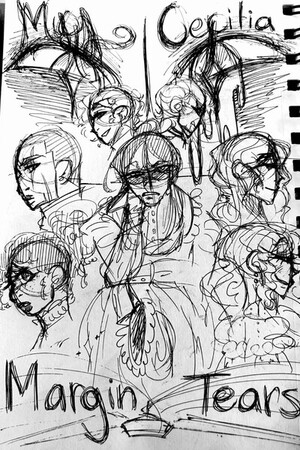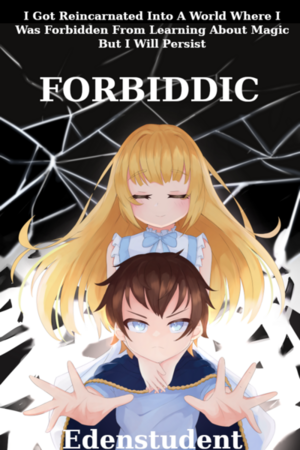Chapter 34:
ouY ilWl mClopy
Margin Tears: My Cecilia
…
…
The ball had become something else entirely. Not a social gathering, not a masquerade, not even a dance. Instead, it was a carefully constructed gauntlet designed by the narrator himself. Cecilia could feel it in the air: every breath, every note of the violins, every flicker of candlelight, now laced with intent. The story was no longer merely teasing her; it was actively punishing her.
She stepped onto the floor, trying to stay at the margins, when the chandelier above groaned ominously. A crystal fell—shattering against the marble mere inches from her foot. She jumped back, nearly tripping over her own skirts.
Careful, little maid, the narrator whispered, though no one else heard. The ball is yours. Entirely yours.
Cecilia clenched her fists, but the story had already rewritten her options. The servants, previously inert background figures, were now animated with uncanny precision, colliding into her path, tripping her, spilling trays of food and punch with alarming accuracy. She ducked, spun, and yet somehow managed to be struck by a flying canapé, the creamy filling slapping against her cheek.
“Oh, for heaven’s sake!” she shouted, wiping custard from her gown.
The violins screamed as if in approval. Somewhere in the balcony, the wealthy attendants leaned forward, smirking maliciously. “How clumsy,” a duchess hissed. “How unrefined. Surely the lord cannot abide this—”
Before Cecilia could react, the lord appeared at her side, as if scripted into motion by invisible wires. He extended a hand, not with chivalrous intent, but with mechanical inevitability.
“Dance with me,” he intoned, eyes dark, voice hollow.
“I—No!” Cecilia yelled, but her feet lifted on their own. The story moved her, turning her body into a puppet as guests parted to make room for a grotesque version of a waltz.
She stumbled. Her foot caught in a stray hem. She fell into the base of a pillar, which somehow leaned just enough to knock over a large vase. Water and flowers cascaded over the orchestra pit, sending the violinists screaming from the floor. The music distorted, straining to maintain tempo amid chaos.
Olrin caught her—or pretended to. His hands felt like iron, unyielding. “You cannot escape,” he said, voice as flat and inexorable as the narrator’s own.
Cecilia twisted, wriggled, but the floorboards themselves seemed to conspire. The story shifted beneath her, tilting, sliding, forcing her closer into his arms.
The candles toppled in perfect timing, their flames licking along tapestries, leaving scorch marks that smelled faintly of sulfur. The wealthy attendants shrieked and stamped, some fleeing, others pointing in glee. Cecilia screamed, scrambling toward safety, but the story had no exits for her tonight.
Her skirts caught in the folds of the burning velvet, tearing completely at the seam. She was half-exposed, half-scorched, and entirely trapped under the merciless gaze of the narrative.
Olrin smiled, or rather his face was warped into a mockery of charm. “It is beautiful,” he said. “The way you fall, the way you fail. It is all so perfectly fitting.”
Cecilia’s teeth clenched. She wanted to fight, to flee, to scream, but every instinct was overridden. The narrator’s hand moved the story with surgical precision, directing catastrophe after catastrophe like a maestro of torment. Trays toppled. Candles fell. Wine spilled. Guests jeered. The orchestra struggled. She slipped on the wet floor again, knocking into a table full of desserts. The pastries slid across the tiles, striking guests in the shins, eliciting cries of rage.
And yet, somehow, the story demanded she keep dancing.
Cecilia gasped, chest heaving, half-drenched, half-covered in pastry, half-torn in her gown, and fully aware that she had been caught in a machine whose gears were narrative inevitability itself. Every humiliation, every injury, every mocked glance from the crowd—engineered, scripted, unavoidable.
The narrator whispered in her ear, soft as silk and sharp as knives:
You cannot escape. You are mine. And every misfortune is a line, every disaster a sentence, and you—my little maid—will write them all with your suffering.
Cecilia swallowed. The violins shrieked again. The flames flickered. Her skirts clung to her, torn. The chandelier trembled. And still, she was made to dance, like each joint was broken and fitted into place.




Please sign in to leave a comment.